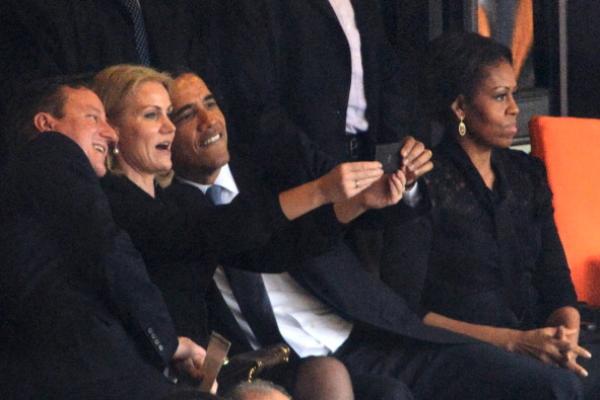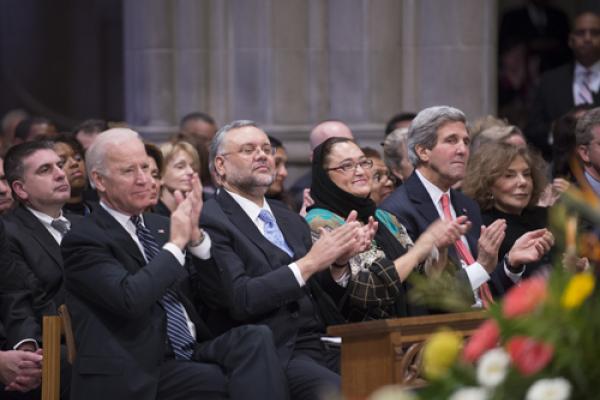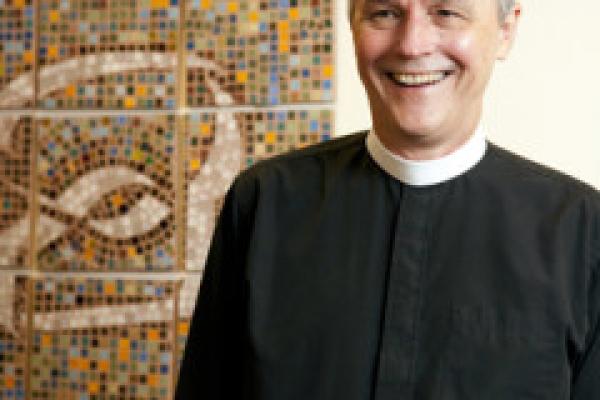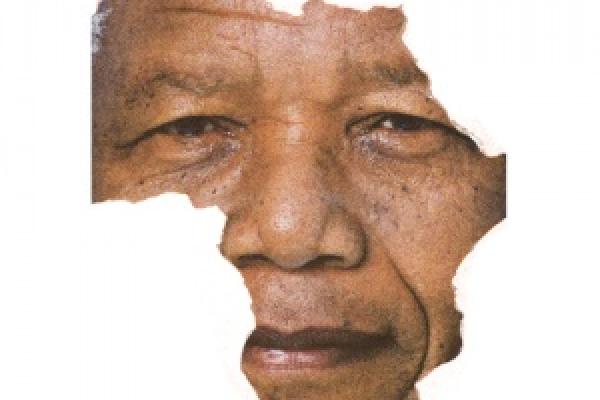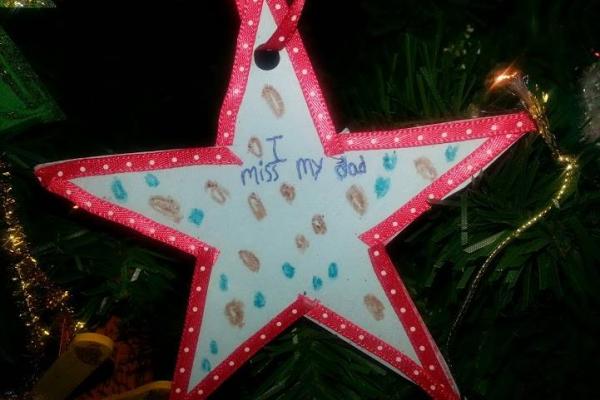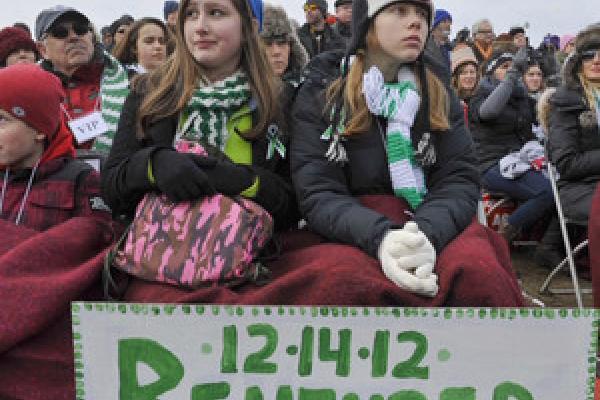One of the downsides of a theological education (and/or an overactive theological imagination) is an inability to sing some favorite old hymns with naive gusto. During this Christmas season in particular, we simply know too much about the biblical story (and the reality of childbirth and babies in general) to fully believe all of the touching words in some of the most popular Christmas carols.
So as a public service, I have written historically accurate versions of three of the most beloved holiday hymns. Without personally endorsing any of the theology below, I also offer some alternatives to those who don't theologically jive with the current version of "Joy to the World."
President Obama’s “selfie” with prime ministers Helle Thorning Schmidt of Denmark and David Cameron of Great Britain has been making the rounds on social media. Many of Obama’s detractors have taken the opportunity to criticize the President’s picture taking prowess, bringing on “Selfie-Gate.” Take John Kass of the Chicago Tribune, for example:
First lady Michelle Obama sits off to the side, somber, dignified, as the world remembers Mandela. Yet next to her like some goofy adolescent who hasn't yet been taught how to behave properly at a memorial service — her husband — is snapping a memorial to himself.
Hold on a minute there, Kass, because South Africa is teaching us a thing or two about how they “behave properly at a memorial service.” Sure they mourn.
But they also dance.
From the video and images that I’ve seen, there was festive atmosphere at Mandela’s memorial service. This leads me to wonder what “proper behavior” at this memorial service looks like.
Joe Biden was a young senator from Delaware when he was first exposed to the evils of apartheid. As the only white lawmaker in a congressional delegation to South Africa, he resisted security officers who tried to usher him through one door, and his more senior black colleagues through another.
“I had what we Catholics call an epiphany,” the vice president said Wednesday as official Washington packed the National Cathedral to recall the life and legacy of former South African President Nelson Mandela.
“He was the most impressive man or woman I have ever met in my life,” Biden said of Mandela, who died peacefully on Dec. 5.
In his first Advent address, Pope Francis directed Christians to be guided by the “Magnificat,” Mary’s song of praise for the coming Christ child. She proclaims that God has “lifted up the lowly and filled the hungry with good things” (Luke 1:52-53). This past Tuesday, Pope Francis heeded his own exhortation by releasing a video message calling for an end to hunger as part of a worldwide “wave of prayer.”
Hundreds of Christian organizations across the globe participated in the “wave of prayer,” which was organized by Caritas International, a confederation of Catholic charities in the Vatican.
“We are in front of a global scandal of around 1 billion people who still suffer from hunger today,” Pope Francis said in his message. “We cannot look the other way.” The wave began at noon on the Pacific island of Samoa and proceeded west with people of faith from each subsequent time zone participating at noon their time.
Today I had the great honor of saying a prayer at the memorial service for Nelson Mandela, the most important political leader of the 20th century. This was an honor, not only because of Mandela’s stature on the world’s stage, but because he was someone I admired very deeply and personally. His fight for justice and reconciliation is one that has inspired me in the work that we do at Sojourners.
There were several highlights of the service today. There were several choirs, two of which brought each mourner to their feet, clapping along to their versions of Shosholoza and Siyahamba. There were many beautiful speeches and recitations, including a reading of Maya Angelou’s poem for Mandela called “His Day is Done.”
But what stood out to me the most was the homily by Rev. Dr. Allan Boesak, Director of the Desmond Tutu Center at Christian Theological Seminary, Butler University. As he paid tribute to Mandela’s life and described his “long walk to freedom,” he punctuated his remarks with “it ain’t over, until God says it’s done,” a quote from Maurette Brown-Clark’s song of the same name.
Saying an opening prayer at the Nelson Mandela Memorial Service on Wednesday, in Washington, D.C. was both an honor and a blessing for me. The theme of the homily, by my good friend Rev. Dr. Allan Boesak, was “it ain’t over until God says it’s done.”
I sat there listening to those words from an African American gospel hymn in the midst of my own circumstance of being on the ninth day of a water-only fast for comprehensive immigration reform. In my weakened condition, I was grateful that I had done the opening prayer and wouldn’t have to do the closing prayer! But fasting focuses you and it made me consider how Nelson Mandela would feel about a broken immigration system that is shattering the lives of 11 million immigrants, separating parents from children, and undermining the best values of our nation.
In our nightly meeting at what is now a packed fasting tent, I could imagine Nelson Mandela there with us, telling us to never give up until we win this victory for so many vulnerable people reminding us, "it ain’t over until God says it’s done." Or, as he would tell cynical pundits and politicians, “it is always impossible until it is done.” Today, following a procession from the Capitol which will now include many members of Congress, we will go to that tent and proclaim that immigration reform is not over, and we won’t give up until it’s done.
After learning about Jesse Lewis, a six-year-old who died in the Sandy Hook shooting a year ago this Dec. 14th, I’m thinking about scratching out the name Jacob in Psalm 146 and writing in Jesse.
Psalm 146, verse 5 says, “Happy are those whose help is the God of Jacob, whose hope is in the LORD their God.” I’m wondering if scratching out Jacob and writing in Jesse, at least in these upcoming weeks, might be a way of praying to transform anger and resentment into love and forgiveness.
Jesse was a pretty amazing six-year old who loved adventures, mud, a golden yellow bear, and his big brother. His mom says he was “full of courage and strength,” so much so, that in the midst of the unfolding tragedy Jesse stood still and told his classmates to “Run!” In so doing, he lost his life.
Scarlett Lewis, Jesse’s mom, returned home after the unthinkable tragedy only to find something wonderful Jesse had scratched onto the kitchen chalkboard: "Norturing, helin, love." His mom knew immediately these were Jesse’s last words to her: Nurturing, healing, love. In her book, Nurturing Healing Love: A Mother’s Journey of Hope & Forgiveness, Scarlett tells the story of her journey to forgiveness and hope as a legacy beyond anger and resentment. She begins, of course, with Jesse’s story.
This past Sunday, I had the opportunity to watch our children’s ministry present through play, song, and dance the story of the birth of Jesus Christ.
No matter how many times I have seen this story, it’s always amazing that this miracle that happened in a manger could have such a huge impact on the lives of so many. Jesus was not born with a silver spoon in his mouth, his parents did not have the best reputation, and he definitely wasn’t birthed in a fancy hospital. Instead, he was born where animals were kept — not the best conditions environmentally at all! Further, Jesus Christ became an advocate for the poor, for those that do not always have a voice, and for those that were suffering from terrible mistreatment, disease, and sickness.
I truly believe that Jesus’s focus on the “least of these” is a model for advocacy, especially for the environmental justice movement.

